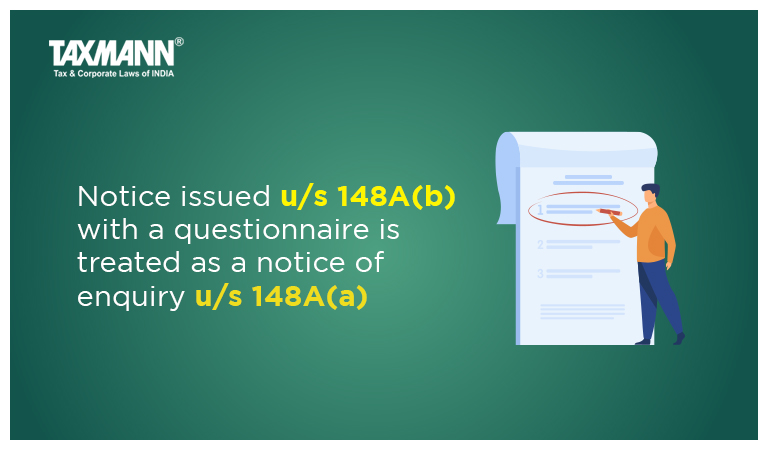Notice issued u/s 148A(b) with a questionnaire is treated as a notice of enquiry u/s 148A(a)
- Blog|News|Income Tax|
- 2 Min Read
- By Taxmann
- |
- Last Updated on 31 August, 2022

Case Details: Swal Ltd. v. Union of India - [2022] 141 taxmann.com 523 (Calcutta)
Judiciary and Counsel Details
-
- T.S. Sivagnanam & Bivas Pattanayak, JJ.
- Ranjeet Kumar Murarka Sr. Adv. Vivek Murarka & Dibanath Dey, Advs. for the Appellant.
- Ms. Smita Das De, Adv. for the Respondent.
Facts of the Case
The Assessing Officer (AO) issued a notice under Clause (b) of Section 148A of the Income-tax Act (‘Act’) directing the assessee to show cause as to why, in view of the details contained in Annexure A of said notice, a notice of income escaping assessment should not be issued.
The assessee submitted their response to the notice and requested the AO to provide a verbatim copy of the information or documents based on which the notice had been issued.
AO didn’t respond to the request made by the assessee and served an order under Clause (d) of Section 148A along with a notice under Section 148.
High Court Held
In the Writ petition, the High Court observed that the notice though purported to have been issued by the AO under Clause (b) of Section 148A. But, on a reading of the Annexure, it was seen that the Annexure did not contain information but it was a questionnaire. This is so because several details have been called for from the assessee and they were requested to submit their explanation with clarification and necessary information. If such is the tenor of the notice, it pre-supposes that the AO was desirous of conducting an enquiry after receiving clarifications and information on the issues mentioned in the Annexure which should have been done through issuance of notice under Clause (a) of Section 148A instead of Clause (b) thereof.
Thus, the High Court held that there was a gross procedural error from the very inception of the proceedings rendering the same as bad in law.
Disclaimer: The content/information published on the website is only for general information of the user and shall not be construed as legal advice. While the Taxmann has exercised reasonable efforts to ensure the veracity of information/content published, Taxmann shall be under no liability in any manner whatsoever for incorrect information, if any.

Taxmann Publications has a dedicated in-house Research & Editorial Team. This team consists of a team of Chartered Accountants, Company Secretaries, and Lawyers. This team works under the guidance and supervision of editor-in-chief Mr Rakesh Bhargava.
The Research and Editorial Team is responsible for developing reliable and accurate content for the readers. The team follows the six-sigma approach to achieve the benchmark of zero error in its publications and research platforms. The team ensures that the following publication guidelines are thoroughly followed while developing the content:
- The statutory material is obtained only from the authorized and reliable sources
- All the latest developments in the judicial and legislative fields are covered
- Prepare the analytical write-ups on current, controversial, and important issues to help the readers to understand the concept and its implications
- Every content published by Taxmann is complete, accurate and lucid
- All evidence-based statements are supported with proper reference to Section, Circular No., Notification No. or citations
- The golden rules of grammar, style and consistency are thoroughly followed
- Font and size that’s easy to read and remain consistent across all imprint and digital publications are applied



 CA | CS | CMA
CA | CS | CMA
